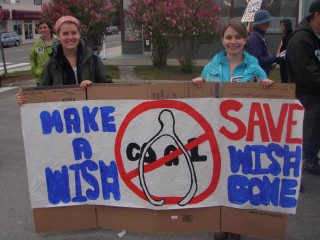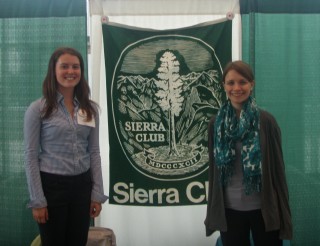Moving Alaska Beyond Coal
By Rachel Fussell and Amy Scoville-Weaver
AMY: I have loved Alaska since I first visited Southeast about five years ago. I remember disembarking from the plane at midnight, having the sun just beginning to set behind the mountains in Juneau, and realizing that I was going to live there one day. When I discovered my passion for environmental studies my freshman year of college, it was a done deal that I would do anything I could to return. I also love being outdoors, so Alaska always seemed like paradise to a girl coming from Phoenix and just finishing schooling in New York. As interns, our typical work day begins with a look at the Alaska daily newspaper to see if there is anything energy or coal related we need to focus on. Than we begin to start our two current projects, which are the Chuitna Coal Mining Project and the Wishbone Hill Coal Mine. This work can take a number of forms, from researching issues and power-mapping key legislators, to making posters and organizing rallies and petition signings.

The campaign to move Alaska beyond coal touches on almost every critical conservation issue that Alaska currently faces. Alaska’s vast coal reserves are highly coveted by both national and international interests and the mining of this coal poses far-reaching environmental, social and economic problems. If Alaska moves to develop its coal industries, the destruction of the land would only be one problem. This mining would pollute the rivers and streams that are the backbone of the Alaskan fishing industries, as mercury and other metals are discharged into the waterways and the ecosystems are disrupted. However, perhaps the most critical consequence of the coal industry is its contribution to global warming. The bulk of Alaska’s coal is shipped to Japan or to China, which burn the coal to feed their energy costs. This burning affects the sensitive climates of Alaska’s arctic and oceans, and poses monumental implications for our future.
My previous internship experience has always placed me in a peripheral position– I was on the sidelines, but almost never allowed to enter the game. However, my work on the coal campaign has placed me right in the thick of the fight and has been a welcome surprise this summer. My first full day in Anchorage had me attending a heated Mat-Su valley borough meeting over the leasing of a permit to the Usibelli coal company for Wishbone Hill. The next week, I was not only planning but participating in rally and petition signing events, as I engaged with a diverse group of Alaskans about the issues at the Kenai River Festival. I am so happy that I am able to engage with people and help them fight for their environmental rights in such a personal way.
My interest in Alaska conservation is in my determination to help keep it that way. I grew up partly in Southern Arizona and partly at the foot of the Appalachian Mountains in West Virginia. As any Arizonian or Appalachian can tell you, the role that natural resource mining has had in these states has been profound. The idea that the lush and untouched mountains of Alaska could one day resemble the stripped and destroyed mountains of my childhood is one that breaks my heart. However, it’s not only the environmental consequences of exploitation that are saddening, but also the serious impact that this can have on communities. I have already learned how closely tied Alaska’s communities and how dependent economic livelihoods are to the environment. If conservation is not made a priority in Alaska, than these communities will bear the brunt of this destruction, as outside interests profit from Alaska’s rich biodiversity and resources.
Rachel: I believe that resource extraction is the most pressing issue Alaska faces. Alaska has a wealth of natural resources that many countries and businesses are exceedingly anxious to obtain. However these resources are situated underneath and through some of the world’s most productive streams, recreational areas, and intact wilderness. The fine line between responsible and sustainable resource management and careless extraction is an issue that Alaska is facing. In order to maintain Alaska’s pristine environments, the state will have to redefine its definition of economic growth and turn to industries that work with the environment instead of against it.

Alaska is a diverse and unique environment. It is one of the few places on earth where humans have yet to permanently impact the environment. Protecting the lands in Alaska is important to me because I don’t want to see this pristine environment make the same mistakes other places had the misfortune of finding out. Alaska is perfectly positioned to protect its way of life and its resources without taking the hard route. Another reason why conservation in Alaska is important to me is because Alaskans still have a connection to the land that has been forgotten in many other places. Conservation in Alaska is about bridging the gap between humans and nature, and how we truly are interconnected. In Alaska, if a stream is threatened, it means that not only the wildlife whose life it supports is impacted, but also local community members. I want to continue to see healthy communities and sustainable practices, and to me Alaska encompasses both.
My field of study is Environmental Studies with a concentration in Environmental Policy and a minor in Ecological Economics. Within my internship I work on stopping proposed coal mines and on moving Alaska beyond coal. I have already used my studies a great deal to help me process and understand the policies and background of the coal industry and resource extraction here in Alaska. This internship will have a positive impact on my career plans because my job helps me to reinforce what I learned at school and take it to the next level. Whether I am going to a Borough Assembly meeting to hear a vote on whether a permit should be given to a coal company or if I am working with individuals to better understand the negative economic implications a strip mine, my education is helping me and I’m learning new skills every day to help foster more growth. This internship has made me more passionate about conservation issues and how I can help be a solution by incorporating what I already know and gaining more insights to help me every bit of the way.


